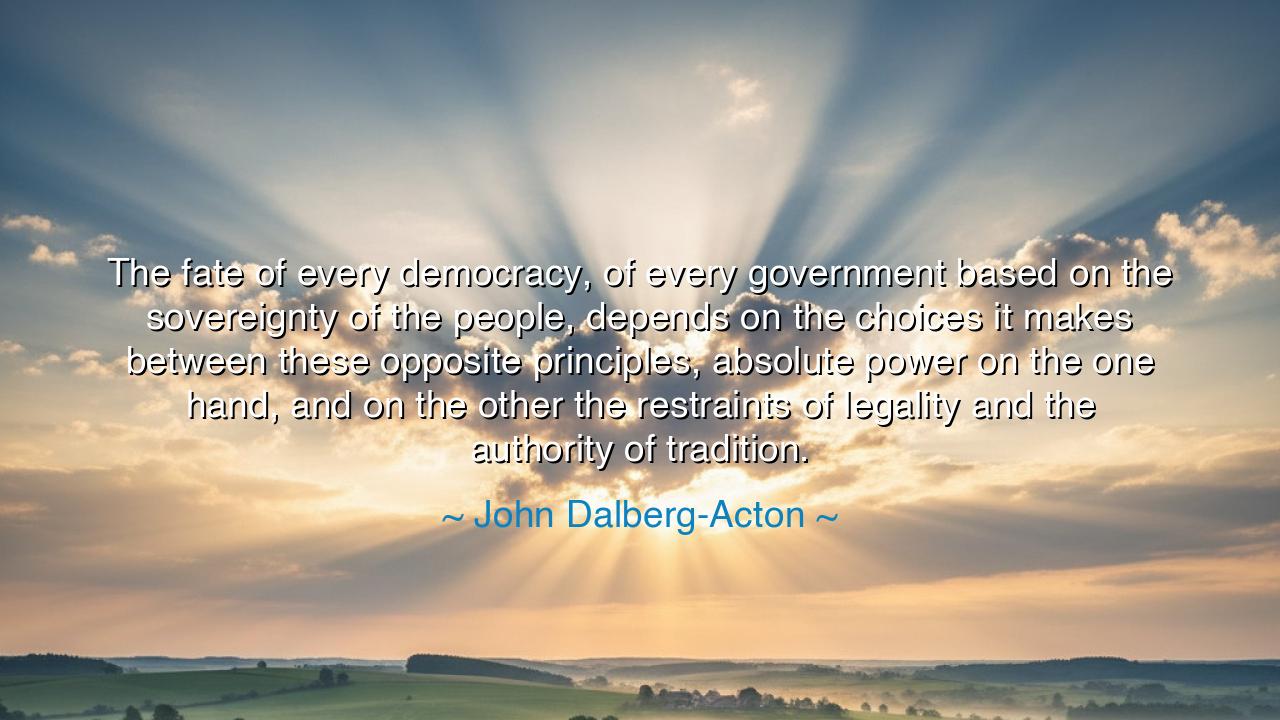
The fate of every democracy, of every government based on the
The fate of every democracy, of every government based on the sovereignty of the people, depends on the choices it makes between these opposite principles, absolute power on the one hand, and on the other the restraints of legality and the authority of tradition.






Hear, O seekers of wisdom and guardians of liberty, the words of John Dalberg-Acton, that philosopher of power and conscience, who declared: “The fate of every democracy, of every government based on the sovereignty of the people, depends on the choices it makes between these opposite principles—absolute power on the one hand, and on the other the restraints of legality and the authority of tradition.” In this statement lies the eternal tension that defines human governance—the battle between unbounded power and disciplined freedom, between the wild flame of authority and the steady light of law.
Lord Acton, as he was known, lived in the nineteenth century—a time when monarchies waned, democracies rose, and revolutions reshaped the world. He was a man who looked deeply into the patterns of history and saw a truth that echoed through every age: the greatest danger to liberty lies not in the chaos of the people, but in the concentration of unchecked power. His words are not the musings of theory, but the product of a life devoted to studying how power, once freed from restraint, corrupts even the noblest intentions.
He warns that every democracy, no matter how noble its birth, must choose carefully between two opposing forces. On one side stands absolute power—the seductive belief that the will of rulers, or even of the majority, can supersede law, tradition, and moral limit. On the other stands the restraints of legality and the authority of tradition—those invisible cords that bind a free society together, preventing passion from turning to tyranny. For even in a system founded on popular sovereignty, liberty dies the moment power ceases to answer to law.
Consider the fall of the French Revolution, that storm of liberty which sought to free mankind from kings and priests, yet soon devoured itself. In its zeal for equality and progress, it cast aside the ancient restraints of law and morality. What began as a cry for freedom ended in the blood-soaked tyranny of the guillotine. There, Acton’s wisdom is proven true: without the discipline of legality and tradition, democracy becomes the mask of despotism.
Yet history also reveals the opposite truth—how law and tradition, when rightly balanced, preserve the very spirit of liberty. The framers of the American Constitution, wary of monarchy yet distrustful of mob rule, built a system upon checks and balances, law and custom. They knew, as Acton knew, that freedom must be guarded not only from kings, but from men who, believing themselves righteous, would wield unrestrained power in the name of the people. Thus they bound the power of government in the chains of law and divided it among institutions—a living testament to the restraints of legality and the authority of tradition.
In this light, Acton’s words are not a condemnation of democracy, but its salvation. He teaches that the strength of a free government lies not in the boundless assertion of its will, but in its willingness to be limited—to respect the rule of law, to honor inherited wisdom, to temper passion with prudence. A society that forgets its moral and legal boundaries may prosper for a moment, but it will, in time, collapse under the weight of its own excess.
The lesson, then, is both profound and practical: power must be bound by principle. Let citizens cherish law as the guardian of their freedom; let leaders remember that the authority they wield is not their own but entrusted to them by the people and by history. Defend institutions, not because they are old, but because they are the bulwarks against the storms of ambition. And let every generation renew its commitment to the delicate balance between liberty and restraint—for in that balance lies the enduring soul of civilization.
Thus, Lord Acton’s voice echoes through the corridors of time, reminding all who govern and all who are governed: the fate of democracy rests not in the loudness of its people nor the power of its leaders, but in its reverence for law, tradition, and the humble acknowledgment that freedom, without restraint, destroys itself.






AAdministratorAdministrator
Welcome, honored guests. Please leave a comment, we will respond soon